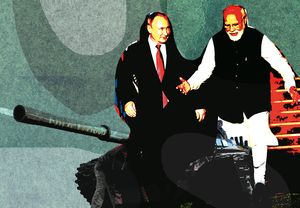These westerners are crazy. Through the last seven months of the war in Ukraine, they had been putting Prime Minister Narendra Modi in the dock. Now they are patting him on the back.
No, Modi didn't do any of the things that Joe Biden, Emmanuel Macron or Liz Truss had been wanting him to do. He didn't condemn Vladimir Putin, didn't send guns for Volodimir Zelenskyy, continued to buy oil from Russia, and went on with business as usual with Moscow.
What then has Modi done that has made him a dear to the west? Little. He uttered a few words of estrangement to Putin in front of television cameras. He told Putin, when they met for the Shanghai gang's conclave in Samarkand, that “today's era is not of war”.
No one would quarrel. Indeed, what Modi said is true, but isn't it also a truism? After all, even if he thought to the contrary, would Modi have said that this is a time for war? In short, Modi didn't say anything that would have set the Dnieper, the Danube or the Volga on fire.
But these diplomats and statesmen are like that—they read too much between the lines, look for meanings in greetings, toast over sweet nothings, and trip over commas in the wrong place.
So did the western world. “Modi is right,” cried Macron of France. In Washington, Biden's national security aide Jake Sullivan hailed Modi's words as “a statement of principle on behalf of what he believes is right and just,” (what's that again?) and that “this is a message that every country should be sending”. British foreign secretary James Cleverly said Modi had “a powerful and influential voice on the world stage” and hoped that “Vladimir Putin listens...”
Did Putin listen? In the melee, they all missed that one crucial point—that Putin didn't say da or nyet to Modi. Worse, what the guy did next was more than enough to signal that he had other plans. He flew back to Moscow, and called out the reservists. If that isn't an all-hands-on-deck call, what else is?
Putin's writings on the blood-splattered walls of Mariupol are fairly clear: the boys won't be home for Christmas—even for Russian Christmas. Russia's Orthodox Church, if you don't know, hasn't yet recognised Pope Gregory XIII's calendar, and celebrates Christmas on January 7.
Anyway, the point is that the nasty war will go on. Or, would it? On second thoughts, was Putin actually listening to Modi's words? Optimists point to the referendums that Putin has ordered in Luhansk, Kherson, Zaporizhzhia and Donetsk, the regions that his troops have occupied. The folks who live there are being asked whether they want to secede to Russia with their homes, hearths and scorched earth. If they say da, Putin will take the territory, declare victory, and end his force march much before even the December Christmas.
The fact is that the folks who live on and off those lands don't need a gun on their back to say da to Putin. Most of them are Russian settlers or their progeny, and would like to be ruled by Moscow rather than Kiev.
The problem is that the west has denounced the vote as a sham. They would say the folk had voted with guns pointed at their heads, refuse to uphold the outcome, and continue to get guns for 'San' Zelenskyy.
What would Modi do then? Tell Biden, Macron and Truss, too, that this is not an era for war? Would they listen?
TAILPIECE: Though she stayed neutral publicly, Indira Gandhi privately pulled up Soviet premier Alexei Kosygin for invading Afghanistan. “You brought the Cold War to our doorsteps,” she told him, records I.K. Gujral in his memoirs. Later, when Leonid Brezhnev asked her how he could get out of Afghanistan, she bluntly told him: “The same way you went in.”
prasannan@theweek.in


